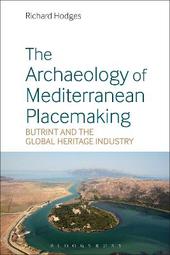
|
The Archaeology of Mediterranean Placemaking: Butrint and the Global Heritage Industry
Paperback / softback
Main Details
| Title |
The Archaeology of Mediterranean Placemaking: Butrint and the Global Heritage Industry
|
| Authors and Contributors |
By (author) Dr Richard Hodges
|
| Physical Properties |
| Format:Paperback / softback | | Pages:184 | | Dimensions(mm): Height 234,Width 156 |
|
| Category/Genre | Archaeology
Classical Greek and Roman archaeology |
|---|
| ISBN/Barcode |
9781350069596
|
| Classifications | Dewey:939.865 |
|---|
| Audience | | Tertiary Education (US: College) | |
|---|
| Illustrations |
50 bw illus
|
|
Publishing Details |
| Publisher |
Bloomsbury Publishing PLC
|
| Imprint |
Bloomsbury Academic
|
| Publication Date |
31 May 2018 |
| Publication Country |
United Kingdom
|
Description
Butrint has been one of the largest archaeological projects in the Mediterranean over the last two decades. Major excavations and a multi-volume series of accompanying scientific publications have made this a key site for our developing understanding of the Roman and Medieval Mediterranean. Through this set of interwoven reflections about the archaeology and cultural heritage history of his twenty-year odyssey in south-west Albania, Richard Hodges considers how the Butrint Foundation protected and enhanced Butrint's spirit of place for future generations. Hodges reviews Virgil's long influence on Butrint and how its topographic archaeology has now helped to invent a new narrative and identity. He then describes the struggle of placemaking in Albania during the early post-communist era, and finally asks, in the light of the Butrint Foundation's experience, who matters in the shaping of a place - international regulations, the nation, the archaeologist, the visitor, the local community or some combination of all of these stakeholders? With appropriate maps and photographs, this book aims to offer an unusual but important new direction for archaeology in the Mediterranean. It should be essential reading for archaeologists, classical historians, medievalists, cultural heritage specialists, tourism specialists as well as those interested in the Mediterranean's past and future.
Author Biography
Richard Hodges OBE, is President of The American University of Rome, Italy. He is the editor of the Debates in Archaeology series; and his publications include Dark Age Economics, The Anglo-Saxon Achievement, Towns and Trade in the Age of Charlemagne, Goodbye to the Vikings and (as co-author) Villa to Village, all published by Bloomsbury. He has previously been Director of The British School at Rome and Director of the University of Pennsylvania Museum of Archaeology and Anthropology, USA. Between 1993-2012 he was Scientific Director of the Butrint Foundation.
ReviewsNo one is better positioned to recount the archaeological history of Butrint than Richard Hodges ... Hodges is a clear and engaging writer whose personalized account make this book hard to put down ... Though not strictly writing a guidebook, Hodges has produced an important and, at times, controversial introduction to the site of Butrint that grapples with many of the critical issues that are faced by archaeologists today as they navigate the way archaeology helps to make a place. * New England Classical Journal * In this brief yet thought-provoking book, archaeologist Richard Hodges examines how the modern Butrint, a UNESCO World Heritage site since 1992, has evolved over time and how narratives about the place have been constructed ... Hodges' meditations on his experience at Butrint underscore the difficulty of responsible archaeology and cultural heritage management. * Bryn Mawr Classical Review * The book is written by one of the most recognized international scholars and excavators ... While the book may serve as an excellent introduction and guide to the site, the real theme is: Placemaking in the Mediterranean and the challenges that face modern archaeology ... Hodges, who has a reputation as a great communicator, describes his experiences. His lively, sensitive, yet very honest descriptions make this a book hard to put down. * Ancient History Bulletin * A rare (and perhaps controversial) book that attempts to deal head-on with issues that are frequently left in the shadows by Mediterranean archaeologists. It challenges perceptions of what archaeology is actually for and should be read by students and anyone concerned with the global heritage industry. * William Bowden, Associate Professor of Roman Archaeology, University of Nottingham, UK *
|